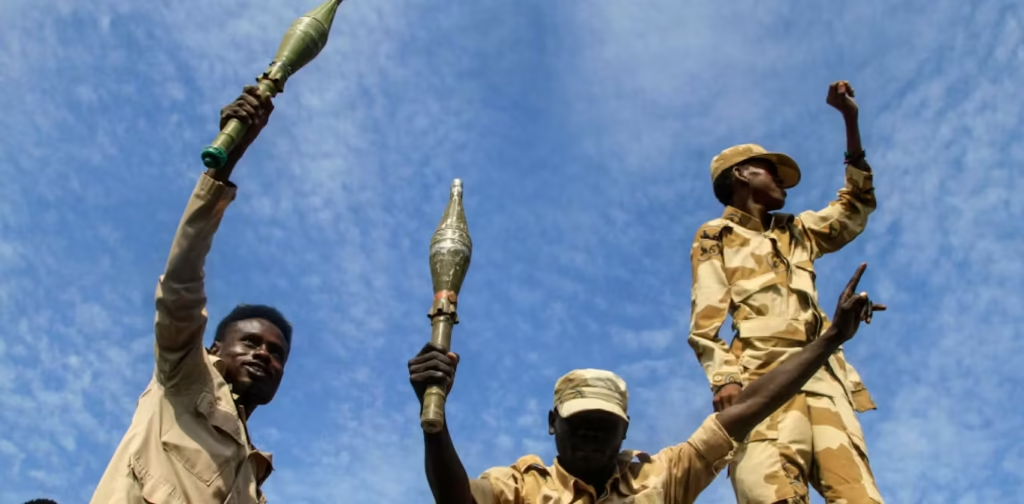Sudan War Fuels , once a hopeful democracy in Africa, is now a country caught in one of the world’s worst ongoing wars. The brutal conflict that started in April 2023 between Sudan’s army and a powerful paramilitary group has turned into a humanitarian disaster. At the same time, powerful countries like the United Arab Emirates (UAE) are accused of turning this chaos into an opportunity to strengthen their economic and political power.
The Sudanese Armed Forces (SAF), led by General Abdel Fattah al-Burhan, and the Rapid Support Forces (RSF), commanded by General Mohamed Hamdan Dagalo (better known as Hemedti), have been fighting fiercely for control of Sudan. Their violent battle has claimed more than 150,000 lives, displaced over 12 million people, and pushed 30 million Sudanese to the edge of starvation.
But amid the suffering, foreign powers are stepping in—not to stop the war, but to use it to their advantage.

The UAE’s Growing Influence in Sudan
The United Arab Emirates, a wealthy Gulf state with global ambitions, has had growing interest in Sudan for over a decade. After the fall of Sudan’s longtime dictator Omar al-Bashir in 2019, the UAE saw an opportunity to increase its influence in the country, both economically and strategically.
The UAE has poured billions of dollars into Sudan in recent years. These investments include cash deposits in Sudan’s central bank, agricultural land acquisitions, and plans to build major infrastructure like ports on the Red Sea. This is not just about business—these investments also help the UAE project its power deeper into Africa and secure its long-term economic interests.
Sudan’s natural resources, especially gold, are at the center of the UAE’s attention.
The Gold Connection: Fueling the Conflict
Sudan is rich in gold, and during the conflict, much of this gold is being smuggled out of the country. The United Arab Emirates has become the top destination for Sudanese gold. In 2022 alone, the UAE imported more than $2 billion worth of Sudanese gold.
This gold trade is not just about wealth—it is directly funding the war. The RSF, which controls many of Sudan’s gold mines, uses the profits to buy weapons, pay fighters, and extend its control across the country. Many reports suggest that gold smuggled through informal routes eventually ends up in the UAE, where it is refined and traded on global markets.
In short, Sudanese gold is not only enriching foreign buyers—it is fueling a deadly war.
The Hidden Role of the UAE in Arming the RSF
While the UAE publicly claims neutrality in the Sudanese conflict, multiple investigations and reports suggest otherwise. United Nations experts are currently investigating whether weapons supplied to the RSF were first shipped through the UAE.
Some weapons, such as Bulgarian-made mortar shells and rockets, were originally exported to the UAE. These same weapons were later discovered in RSF-controlled areas of Sudan, raising serious concerns about how they got there. Some evidence suggests they may have been delivered through neighboring countries like Libya, Chad, and South Sudan, using covert routes and disguised as humanitarian aid.
Moreover, the UAE has been accused of running supply chains that send not only weapons but also other military gear to RSF fighters, using cargo flights and logistics networks across Africa. These efforts are reportedly managed in partnership with private military contractors and possibly foreign mercenaries.
Despite these serious allegations, the UAE has consistently denied providing any direct military support to the RSF.
Recruiting Fighters and Forming Alliances
Beyond weapons, the UAE has also reportedly recruited Sudanese fighters—mostly from the RSF ranks—to fight in other conflicts, such as the war in Yemen. The UAE has a history of using foreign fighters to support its military interests in the region, and Sudan has been a key source of manpower.
Some analysts believe that this is part of a broader strategy. By backing a powerful group like the RSF, the UAE can keep influence over Sudan’s future government, especially if the RSF wins more ground or eventually shares power.
The UAE is also said to have worked closely with Russia’s Wagner Group, a private military company known for its activities in conflict zones. This relationship helped secure access to gold mines and strategic territories, especially in Darfur, a region long known for ethnic violence and war crimes.
The Human Cost: Genocide and Starvation
While the geopolitical games continue, the people of Sudan are paying a terrible price. Millions have been forced from their homes. Entire towns and villages have been wiped out. Families are separated, and famine looms in many parts of the country.
Human rights groups and international observers say the RSF has committed atrocities, including genocide, ethnic cleansing, and sexual violence. Civilians are being targeted, aid workers are blocked from delivering help, and refugee camps are overwhelmed.
Despite these horrors, the global response has been weak. Appeals from the United Nations for humanitarian funding have fallen far short. Peace efforts have stalled, and no major power has stepped up to end the conflict.
What’s worse, some of the same countries with the power to influence peace are also benefitting from the war—whether through gold, land, or military influence.
The World Must Act
The situation in Sudan is a tragedy made worse by silence and neglect. While millions starve and suffer, foreign powers like the UAE continue to gain from the chaos. Whether through gold deals, weapons supplies, or farmland investments, they are building influence while a country collapses.
If the international community wants peace in Sudan, it must start by holding these external actors accountable. That includes investigating and stopping the illegal flow of gold and weapons. It also means putting pressure on governments and businesses that profit from Sudan’s misery.
Without accountability, the war will rage on, and the people of Sudan will continue to pay the highest price.


